Europa Universalis Preview
The PC adaption of the strategy board game is coming to US shores, and we've got first details.
Europa Universalis seems like a game that could have been created only in Europe. Probably the biggest difference between North American strategy games and their European counterparts is that the Continental games seem to place a greater emphasis on a sense of atmosphere and presentation. This is something that goes beyond mere graphics and encompasses everything about the game, from visuals to pacing and gameplay. With Europa Universalis, Swedish developer Paradox Entertainment has set out to do nothing less than encapsulate 300 years of European history into a complex yet playable simulation that virtually transports you to the age of colonization and then translates that historical era into a compelling game. If that sounds like an impossible task, then you haven't played Europa Universalis.
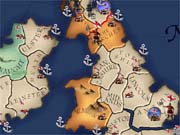
Europa Universalis is actually based very closely on a specialty board game of the type that takes a day to set up and usually lasts for half a turn (which nonetheless takes five hours) before everyone packs it in, all the while remarking what a great design it truly is. The computer version aims to capture the tremendous scope of the original while making it possible to actually finish a game. While the gameplay is incredibly deep, the conversion to the computer has streamlined certain bookkeeping functions and created a game that plays well and has a smooth flow.
The board game version of Europa Universalis was turn-based, but for the computer implementation, Paradox has switched to a real-time model. While die-hard strategy gamers might think this is sacrilege, the adjustable real-time engine elegantly solves certain problems, such as having to hit the "next turn" button 30 times to get through particularly slow periods. In the computer game, you can simply turn up the time compression until weeks and months are flying by, then slow it down as the hard decision-making points arrive. You can also pause the game and give orders that way. Europa Universalis actually requires a lot of preplanning, so pausing every so often to assess your situation is not a bad idea.
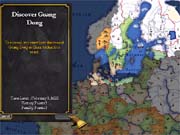
The graphics in the game are not 3D accelerated or unusually good looking in and of themselves, but they are attractive enough and are done in a style that evokes an old cartographer's map of the world. This helps create the atmosphere that gives the game its unique character. The unexplored world (outside Europe) is blacked out (actually "whitened" out) and marked as terra incognita. Only exploration will reveal what lies beyond. The map itself is divided into provinces and sea zones, which regulate movement. The structures in the various provinces are depicted as period buildings, and the soldiers on the map are sprites that have different animations depending on the action they are performing, such as fighting a pitched battle, besieging a fortification, or marching to a new destination. The interface is functional and allows the map to be displayed in modes that show diplomatic and trade relationships as well as political boundaries.
You don't have to know anything about history to play Europa Universalis, but after playing it several times, you'll undoubtedly come away knowing more than you did. The draft manual features an explanation of the rules and a historical commentary that elucidates how the game and its rules reflect the realities of the European continent at the time.
Playing Court Politics
As a monarch in the world of Europa Universalis, you'll have a lot of things to consider as you manage your empire. One very interesting feature is that, while you lead your country, you actually take on the characteristics of certain historical monarchs. You could have superior administrative skills (like Süleyman I of the Turks), or you could be an outstanding military commander (like Jan Sobieski of Poland or Charles XII of Sweden). There are 30 historical leaders represented in the game, ranging from such luminaries as Louis XIV and Elizabeth I to Peter the Great.
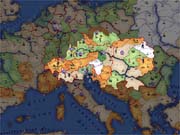
A game of Europa Universalis is very much an experience in a combination of strategic thinking as well as constant micromanagement. Managing your nation's development involves advancement in four different technologies: land warfare, naval warfare, trade, and infrastructure. These confer advantages in battle, trade, and income. Since advancement in the technological categories is linear, there is no technology tree, but you have the freedom to set priorities that direct how much of your income to spend on each area. Achieving various technology levels gives you access to new units. You can also spend money on stability (discussed below) or allocate money to the treasury.
Rebellious provinces are of particular concern in the game. The need to balance expansion, trade, and domestic politics means that one or more of these things will inevitably suffer. When domestic politics become frayed, provinces can rebel. Some of the things that can trigger rebellion are religious differences, excessive taxation, and even a specific condition known as "Dutch nationalism," which can affect certain Dutch provinces in the latter part of the 1700s. Some provinces (based on large homogenous ethnic populations) are susceptible to developing liberation movements, which can agitate for independence. A revolt can even topple your government, in which case the new government assumes power and things become quiet again, but you suffer a big penalty in victory points.
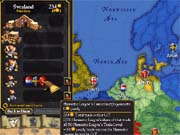
A major focus of Europa Universalis is the colonization of previously unexplored land, such as Asia and the New World. Exploration not only earns you victory points for conquered territory, but it also generates trade, which is one of the key elements in the game. It's important to realize that much of the political map of Europe is static for long periods of time, with only certain provinces changing hands. The dynamic part of the game is race to colonize the new territories. Explorers and conquistadors are special units that can explore parts of the map more rapidly than conventional units. Essentially, these dynamic individuals are much less susceptible to the attrition that is the price of the movement of men and ships throughout the game. Just moving an army from one province to another can incur wastage and weaken your forces, and moving fleets over large distances will reduce their strength. Movement is not as taxing on explorers and conquistadors, and they can open up new territories quickly. The game starts with only Europe known to the players, and as you move through the game, your explorers will reveal more and more of the globe, eventually extending the map across the Atlantic and Pacific oceans. The game even accounts for historical events outside Europe, and in 1636, you'll experience the closing of Japan, wherein that country ceased all contact with the outside world for 250 years.
Making War in Enlightened Europe
Europa Universalis is not a "build and conquer" game in the traditional sense, and anyone looking to build hordes of Cossacks and sweep westward from the Russian steppe are going to be disappointed. Because it is a geopolitical simulation rather than just an arms-race game, Europa Universalis acknowledges that wars in Europe were fought for reasons, that they exerted serious pressures on the combatants, and that it was in no one's interest for the loser to be annihilated entirely. A key concept in the game is stability, which refers to the legitimacy of the monarch in his or her relations with his or her subjects and with the international community. A stable Europe was maintained through a network of international codes of conduct, and rulers didn't simply march into their neighbors' countries with an invading army just because they thought they could win. Instead, monarchs needed a casus belli, or reason to declare war. These can range from ancient enmities that have historically existed between two nations (and are represented by a permanent casus belli between the two during a scenario) to temporary excuses like the failure to repay a loan, honor an alliance, or refusal to trade.
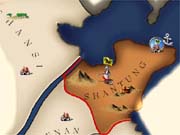
Wars will, of course, be waged, and battles will be fought. When this happens, combat is resolved somewhat abstractly. There is no tactical system that allows you to control the maneuvers of the individual units. Rather, the victor will be determined by strength of numbers, relative military technology, morale, fortifications, and several other variables that were crucial in warfare at this time. Battles can also be influenced by the skill of various commanders. In short, while combat is not explicitly played out on a tactical level, most of the relevant factors are taken into account, and victory in battle will come to those who have prepared their countries well to face the strains of national warfare. This is especially true because nations with a stability factor at the bottom of the scale cannot declare war at all.
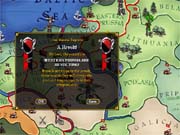
When wars are won, the victor doesn't just annex the loser's country and move on to the next conquest. Instead, a peace treaty must be negotiated, and this treaty may involve the ceding of provinces and/or the payment of tribute to the victor by the vanquished. The extent of the victory determines what is an appropriate peace treaty: The more complete the victory, the more land and money can be demanded. The outcome of wars is determined by victory points gained and lost during the fighting. Victory points are scored for having high stability, winning battles, and conquering provinces, and the loser of such battles also loses victory points. Once a peace treaty has been signed, breaking it indiscriminately can have severe consequences for your nation's stability. This means that you have to choose your wars carefully, deciding when to take advantage of a casus belli and knowing what you hope to achieve before the fighting begins. Europa Universalis shows just how much war is an extension of politics (to paraphrase Carl von Clausewitz). Unlike traditional 4X games, expansion is not the only path to victory. Sometimes staying put is just fine.
Walking the Paths of History
The clear aim of Europa Universalis is to re-create the political, economic, and social factors that existed in Europe at this time and to allow you to work within these restrictions to direct the fate of your own country. The major nations depicted as player countries in the grand campaign (1492-1792) are Spain, Portugal, France, England, Austria, Russia, Denmark-Norway, Sweden, The Ottoman Empire, and Poland-Lithuania. Each has its own particular advantages and disadvantages, and they all play very differently. Europa Universalis is one of the very few games in which a nation can be quite successful as a peaceful trading nation with no ambitions to expand through the use of military force, since trade brings prosperity and a high stability rating, both of which gain victory points. However, those wishing for a more militarily-oriented game can choose to change the victory conditions to "conquest," meaning that the country that conquers the most provinces wins. Other victory conditions can include "power struggle," where you essentially race to see who can be the first to a predetermined number of victory points, or "mission," where each country has a mission to achieve (much like the individual missions outlined by monarchs during the game, only larger in scope). There are several smaller scenarios (like the Great Northern War between Poland, Sweden, Russia, and Denmark-Norway) in addition to the grand campaign.
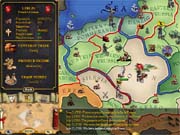
The factors that are taken into account in modeling the dynamics of Europe are too numerous to name here, but an example is the idea of religious tolerance. A country that has a multiplicity of religions has a good chance of suffering rebellions during war as religious minorities seek to gain even greater freedom. A partial solution to this is to repress all but the officially sponsored state religion, but that opens up the possibility that a country whose official religion is the one being repressed in your country may find it necessary to declare war on you in order to liberate their oppressed spiritual brethren. A nation can be Sunni or Shia Muslim, Catholic, Counter-Reformation Catholic, Protestant, Reformed, and Orthodox Christian. All of these have different effects on various aspects of play. For example, a nation's official religion has a hand in determining the number of settlers it gets annually. The game also depicts various historical events that shaped Europe. Four important ones have to do with religion: the Reformation, the appearance of John Calvin, the Council of Trent, and the Edict of Tolerance. Each of these has a different historical effect on the relation of the religions to each other. If you don't know what these four events were, the manual explains all. Or you can find your old high-school textbooks.
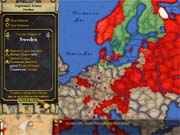
Despite its sometimes contemplative pace, Europa Universalis has the potential to combine the depth of gameplay found in Civilization II with the historically flavored RTS genre created by Age of Empires. The gameplay mechanics are very deep and involving, but the overall presentation is so clean that you will spend far more time planning strategy than looking up rules. The game can also be played with up to eight players via the Internet or an LAN. There is far more to the game than can be adequately explained in the space of a preview (the manual in its current form runs to 128 dense, closely spaced pages), so North American gamers interested in sampling this unique blend of history and strategy can look forward to a release in February of 2001. We'll have a final review for you right around that time.
Got a news tip or want to contact us directly? Email news@gamespot.com
Join the conversation